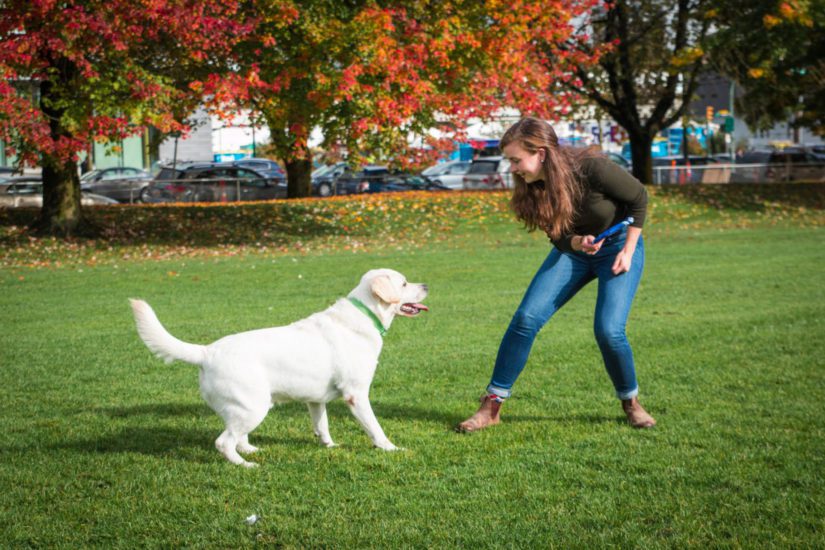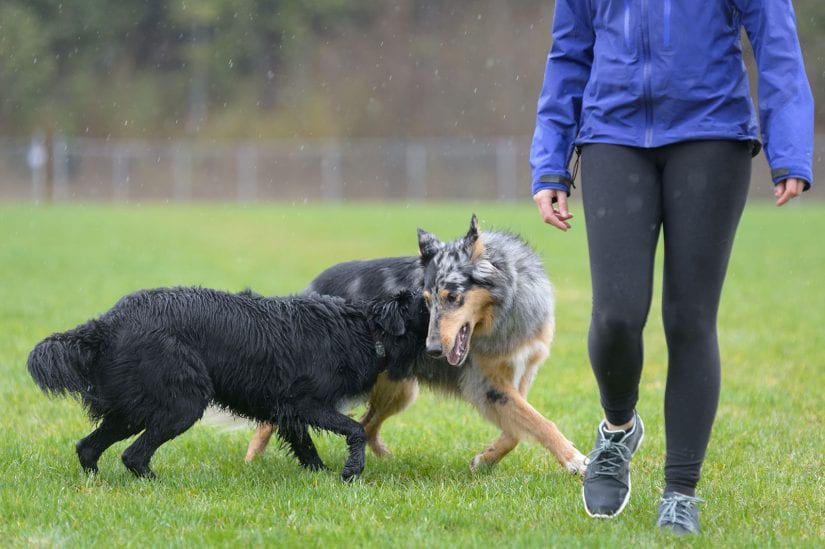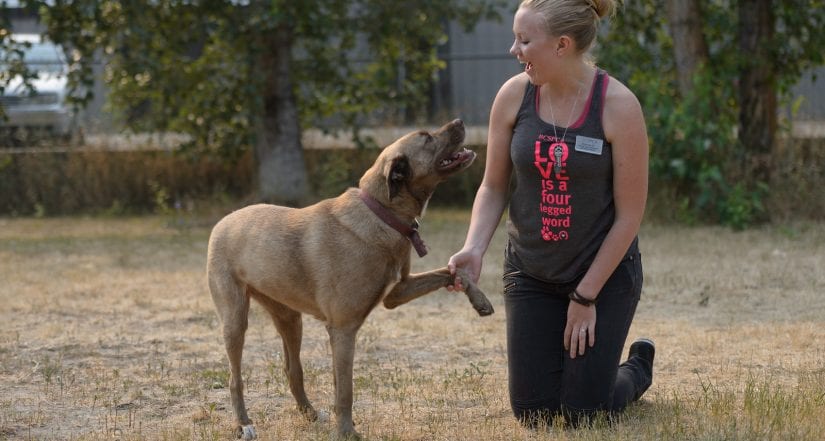If you’re headed back to work or have a jam-packed day, it’s important that your pets receive care, attention and exercise when we can’t be there to tend to their needs.
A dog daycare can be a great choice for some dogs. Rather than stay home with the potential of being bored (and getting into mischief), a dog daycare provides exercise and stimulation in a supervised environment.
However, leaving your beloved furry family member in unfamiliar environment means leaving your pet’s health and welfare in someone else’s hands. Dog daycares are unregulated businesses with a wide range of animal care and handling practices. This is why it’s crucial to do your due diligence when selecting a doggy daycare.
Below AnimalKind accredited trainer Allison Schaefer, of Ethical Canine, offers some tips on what you should consider to select the dog daycare that is best for your pooch.

Ensure that only humane, reward-based dog handling methods are used
“It’s really important to carefully consider who you are leaving your pet with,” says Schaefer. “There are far too many stories of pets suffering when left with others. From people who are just ignorant of dog behaviour and care – because there are no standards or qualifications required for dog daycares — to facilities that are downright neglectful or intentionally cruel.”
Ask the daycare, “What do they do if a dog is barking? What do they do if a dog is bullying another dog? How do they prevent scuffles?” says Schaefer.
Schaefer says it’s important to as well as ask about the usage of aversive tools. If a daycare relies heavily on managing dog behaviour with things like squirt bottles, anti-bark collars or nylon muzzles to prevent barking then walk away. These tactics can cause physical pain and psychological pain distress for your pet.
Instead look for dog daycares that only use humane, reward-based training methods to supervise and interact with dogs. Humane dog management methods are grounded in science and are highly effective in addressing unwanted behaviour, as well as being better for your dog.
In addition, a good sign of a facility’s integrity, says Schaefer, is if they have a camera that allows you to watch during the day. “[That provides] great transparency.”
Ask about how the dogs are sorted into play groups
Schaefer says a dog daycare should have separate sections for large and small dogs. “Dogs should also be placed in play groups with other dogs who have similar play styles and energy levels. Not every dog is going to love every other dog’s company, and that’s OK!”
Schaefer also recommends that daycares should have resting time as well as play time. “Young dogs can play hard, and if they play all day long, they can become overstimulated. Having nap time or breaks is really helpful and more naturally mimics a dog’s life at home.”

Consider the dog-to-caretaker ratio
“Sometimes my training clients will tell me that their dog had an ‘incident’ at daycare but they can’t get any real details about what happened, which tells me that the dogs aren’t actually being supervised,” says Schaefer. “It’s concerning!”
While Schaefer says the optimal ratio of pets to caretakers also depends on the space available, her ideal scenario would include playgroups being on the “smaller side” with at least two caretakers providing direct supervision in case of scuffles, a dog becoming overwhelmed or an emergency occurring.
“A doggy daycare that screens their dogs carefully, matches and monitors playgroups, and has an adequate staff to dog ratio should have very few fights,” says Schaefer. “The staff will be well-educated in dog body language, so they can see signs that play partners might be getting overwhelmed or uncomfortable, and can interrupt or redirect dogs with verbal cues or even collar grabs if necessary, which would ideally pair with positive reinforcement.”
If a fight does break out, Schaefer says staff should have a plan in place and this may involve making a loud noise, sprays and a safe method to separate the dogs. However, she stresses, these methods should only be used in an emergency and not part of daily animal management.
What kind of certification should a doggy daycare provider have?
Currently, there aren’t any certifications required to operate a dog daycare. However, Schaefer thinks dog handlers “should be well trained in dog body language and should have extensive training from the owners or managers of the daycare, especially if they do not have dog behaviour-related certification,” she says. “If a daycare offers AnimalKind accredited training services or consults with an AnimalKind accredited trainer to train staff, then you can be confident that humane handling methods are a priority.” It’s also “ideal” for daycare workers to be certified in canine first aid so they have an idea of what to do in an emergency.
Facility considerations
When choosing a facility, Schaefer says it’s important to consider the cleanliness, sanitation, and vaccination requirements to keep your pet safe and healthy.
At a minimum, says Schaefer, dogs should have constant supervision, in addition to staff having easy access to emergency phone numbers for vets, a plan in place if a dog needs to go to the vet, as well as contact information for the dog’s guardian.

Remember: not every dog is suited for a dog daycare
“Not all dogs are destined to be daycare dogs, and that’s okay,” says Schaefer. “Your dog may not need a daycare environment to be happy. They may prefer social interactions with dogs they know, or maybe not spend much time with other dogs at all, especially as adults. This is normal.”
Schaefer adds that while a humane, well-run daycare can be an enriching part of a dog’s life, it is still only a part of what makes their life enjoyable.
“Dogs need exercise, training and bonding with their own families as well,” she says. “And a poorly run daycare can absolutely have long-lasting negative effects on a dog’s mental well-being. So be highly selective!”
More like this
Finding a pet boarding facility/daycare
Find an AnimalKind Dog Trainer
